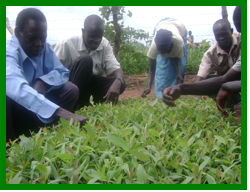Environmental Conservation Project (2011)

April 1, 2011
Refugee Empowerment International had an ongoing partnership with Lutheran World Federation (LWF) to support environmental rehabilitation in Uganda. This project restored the environment at Internally Displaced Persons (IDP) camps and villages of origin in Kitgum and Lamwo District by building local knowledge in sustainable environmental management and conservation and by empowering individuals to improve practices in modern farming.
In particular, this project supported school eco club activities, including establishing and managing school woodlots, orchards and vegetable gardens. The environmental conservation practices were disseminated by the eco clubs through dramas and competitions. The eco clubs had a broad significance as children could share their knowledge with their peers as well as their parents and guardians in the wider community.
200 households were selected to participate in the project and were given seedlings to establish and manage gardens and orchards. Members of the eco clubs, teachers, environment committees and LWF participated by monitoring the progress of woodlots, orchards and gardens. The involvement of the communities in implementing this project promoted the necessary ownership for the project to become sustainable.
Background
The population of Northern Uganda was affected by a 20 year civil war between the Lord’s Resistance Army and the Government of Uganda. Over 90% of the residents in Kitgum were displaced, putting tremendous pressure on fragile lands around IDP camps. Between 1990 and 2005, Uganda lost 27% of its total forest and woodland cover through indiscriminate clearing for firewood and building materials, uncontrolled bush fires, and slash and burn methods of preparing the land for cultivation and pest control. Loss of vegetation has exposed the land to soil erosion and exhaustion; as a result, farmers are faced with reduced productivity from their fields and thus low household incomes. Women and children, the main gatherers of firewood, are required to walk long distances and have less time to engage in productive activities or, in the case of children, to attend school.
Since the peace talks in 2006, Northern Uganda has seen massive movement of the IDPs from the camps back to their villages of origin. As the returnees resettle and begin re-opening their land, sustainable environmental conservation strategies are needed to replenish depleted natural resources and preserve soil fertility.
Results
The project supported two hundred households in two parishes to improve on the local tree coverage by planting trees in their homes. The households were supported with 4,800 teak seedlings and 1,350 pine seedlings to establish woodlots in their homes with the village environment committee members helping to sensitize the communities on good practices of environmental conservation.
The project has maintained one central tree nursery in Omiya Anyima Sub County to produce tree seedlings and to serve as a training/learning centre for schools and the communities. 15,437 (Wood=11,205, Fruit=4,232) tree seedlings have been distributed to 645 farmers (494males, 151 females), 4 primary schools and two other institutions.
Four school eco clubs were formed in four primary schools to increase the adoption and dissemination of information on environmental conservation practices. The members have been supported with four hundred improved citrus seedlings to plant and manage in their individual homes so that other community members could also learn from what the children have been learning in the schools. There was also a training course designed to equip teachers with knowledge and skills in tree planting and management as well as vegetable production. The primary schools and households were also supported with improved varieties of vegetable seeds to at the start as they plan to in future acquire on their own after attaining good knowledge on vegetable growing.
Case Study
Lajok ogayo primary school in Omiya Anyima Sub County is one of the primary schools in the sub county that LWF works with to increase knowledge in sustainable environmental management through tree planting and other conservation practices. The eco club received the training on tree planting and vegetable farming from the patrons and this has had a positive impact on the school children.
Quote
“We now know how to establish a nursery for trees and vegetable seedlings”,
The chairperson of the eco club, Odong-ngolokop Joel